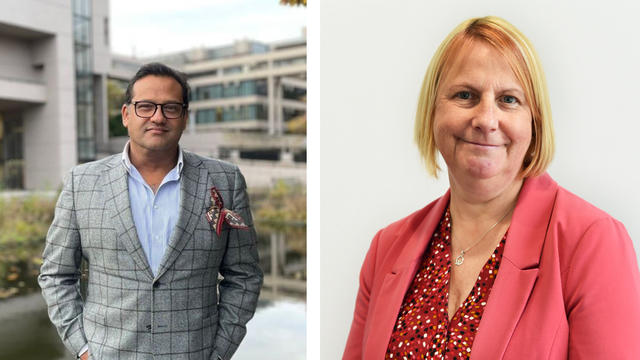New Climate Commission Co-Chairs to help Leeds achieve ambitious net zero target
12th August, 2024 - 09:09

Two new Co-Chairs have been appointed to the Leeds Climate Commission to help accelerate climate action across the city.
It has been seven years since Leeds founded the first-ever local climate commission under Professor Andy Gouldson of the University of Leeds, inspiring other cities, counties and the whole of the Yorkshire and the Humber region to form similar independent place-based collaborations.
In 2023, Leeds Climate Commission underwent a refresh, with a focus on filling the ‘missing middle’ in local climate action across the city. The Commission now has two new Co-Chairs, business leader Farakh Masood, and Councillor Dye Chair of Leeds City Council’s Climate Emergency Advisory Committee.
Mr Masood and Cllr Dye will work together with Rosa Foster, Climate Commissions Director at the University of Leeds, to provide strategic leadership that enables the Commission to support the city to achieve its ambitious climate target of net zero by 2030 as well ensuring the city is well adapted and resilient to future climate impacts.
The focus of the Commission will be on three core areas:
-
Carrying out an ongoing and independent evaluation of progress on climate action in the city;
-
Convening and facilitating stakeholders across the city to share effective climate action initiatives, maximising their impact; and
-
Creating collaborations and managing partnerships that drive ambitious new climate action across the city, targeting sectors and areas based on the evidence from the ongoing independent evaluation of progress.
Farakh Masood brings 28 years of experience in the global B2B sales and service industry, and a global, multifaceted perspective to the role. His background in engineering and law, combined with his entrepreneurial vision, positions him uniquely to drive forward the Commission's goals.
Farakh's vision for the Leeds Climate Commission is to establish Leeds as a global exemplar in achieving net zero by 2030. His strong commercial background will focus on harnessing industry potential to offer sustainable solutions, enhance efficiency, and maintain competitive advantage in the global marketplace.
Central to his strategy is fostering partnerships with local stakeholders to ensure a just energy transition, making Leeds the first net zero city in the UK. Farakh's appointment marks a significant step in the Commission's mission to foster a socially responsible and environmentally sustainable transition for businesses and the community.
“My passion is furthering a 'Just' Energy Transition for everyone. I advocate for a pragmatic approach to energy transition focusing on results." - Farakh Masood
Cllr Katie Dye is Chair of Leeds City Council’s Climate Emergency Advisory Committee. She has more than 30 years’ experience of teaching science, and raising awareness of the climate and ecological crisis has been a significant part of her work in school and in the Killingbeck and Seacroft ward she represents.
“I am excited to take on the role of Co-Chair of the Leeds Climate Commission and to have the opportunity to work with Commissioners from across a wide range of sectors with a wealth of experience. I hope that I can use my council role to develop the links with the work that the council is doing and my educational background to amplify and support the voices of young people. - Cllr Katie Dye
Rosa Foster, Climate Commissions Director at the University of Leeds, said: “The Leeds Climate Commission is a fundamental part of the University’s leadership on climate action, and I am delighted to be able to work closely with Farakh and Cllr Dye in their role of Co-Chairs.
“They both bring a wealth of experience and a huge amount of passion and ambition, and I know the Commission will go from strength to strength under their leadership.
“With just over five years to go to become the first net-zero carbon city in the world, the Commission has a critical role to play to support all the major actors, collaborations and partnerships across the city to work together to realise this ambition, whilst also ensuring our city, and its anchor institutions across all sectors, start to adapt and prepare for an increasingly unpredictable and more extreme climate.”
Background
Leeds Climate Commission supported the declaration of a city-wide Climate Emergency in March 2019 and provided the evidence base for this in the form of a science-based roadmap for Leeds. In the same year, it partnered with Leeds City Council on the Big Leeds Climate Conversation, garnering responses from almost 8,000 Leeds residents. The Commission also ran the Leeds Climate Change Citizens’ Jury, recommendations from which helped to inform Leeds City Council’s Climate Emergency Update report and next steps, including a commitment to more than halving emissions by 2025.
In 2021, the Commission updated the Net Zero Roadmap for Leeds, showing how Leeds can radically reduce its carbon footprint whilst also becoming a better place, with cleaner air, improved public health, reduced poverty and inequality, increased employment and enhanced prosperity. The roadmap highlighted opportunities to stimulate the development of the city through climate action and the need for a green recovery plan with investment in the decarbonisation of homes, businesses and transport systems at its heart.
It has also taken on controversial issues though its position papers on hydrogen conversion and the Expansion of Leeds Bradford Airport and incorporating aviation into the Leeds Carbon Roadmap to show its impact, which made headline news.
University of Leeds support
The Commissions’ Team, hosted by the University of Leeds, also supports the Yorkshire and Humber Climate Commission, and is involved in supporting the University to deliver its own Climate Plan, which also includes a clear commitment for the institution to become net zero by 2030. Maximising its civic impact by supporting Leeds to become a net-zero and climate-ready city is a foundational part of the Plan. The University also recognises that it isn’t possible for the University or city to achieve these goals in isolation, and so its leadership and support extends to the wider region through the Yorkshire & Humber Climate Commission.
The Commissions’ team is funded through a mix of University Climate Plan funding, donor contributions including from Yorkshire Building Society, Yorkshire Leaders Board, Northern Powergrid and Yorkshire Water; and research collaborations including the Yorkshire Policy Innovation Partnership. If you or your organisation would like to support the Commissions’ work financially, please contact the team at yhclimate@leeds.ac.uk.
Opportunities to get involved
We want to grow Leeds Climate Commission and have a number of opportunities for individuals and organisations to get involved in its work. To express your interest in being part of the Commission, or to receive updates on the Commission’s work, please email Leeds Climate Commission Programme Manager Millie Duncan, a.k.duncan@leeds.ac.uk.


